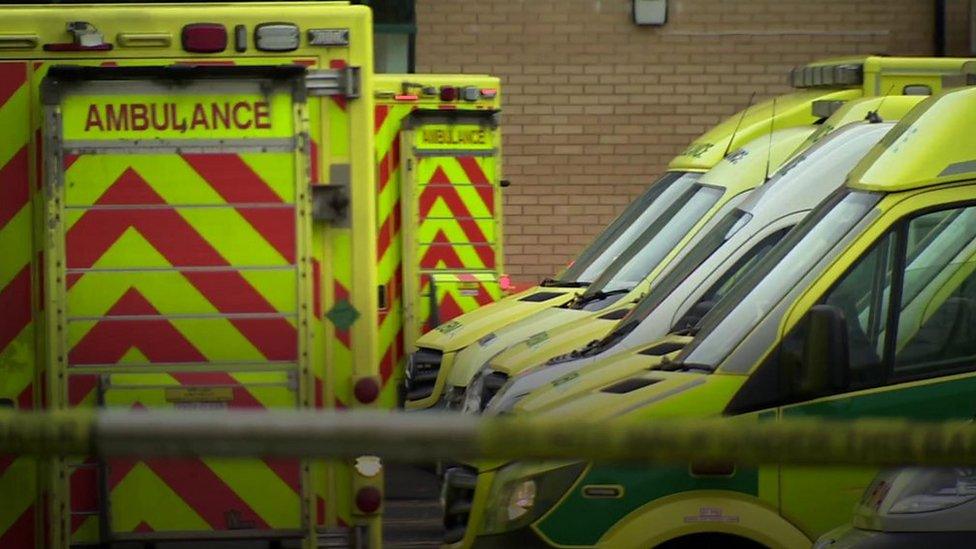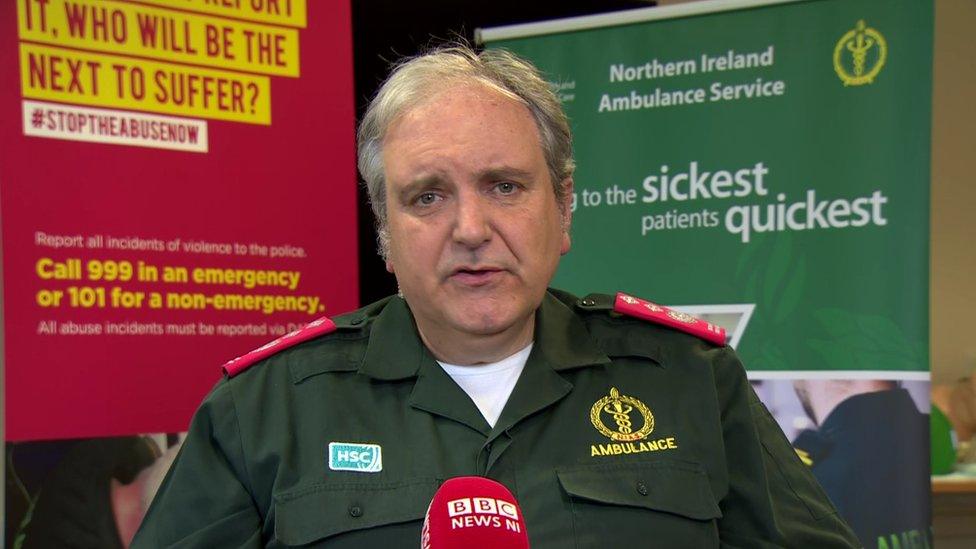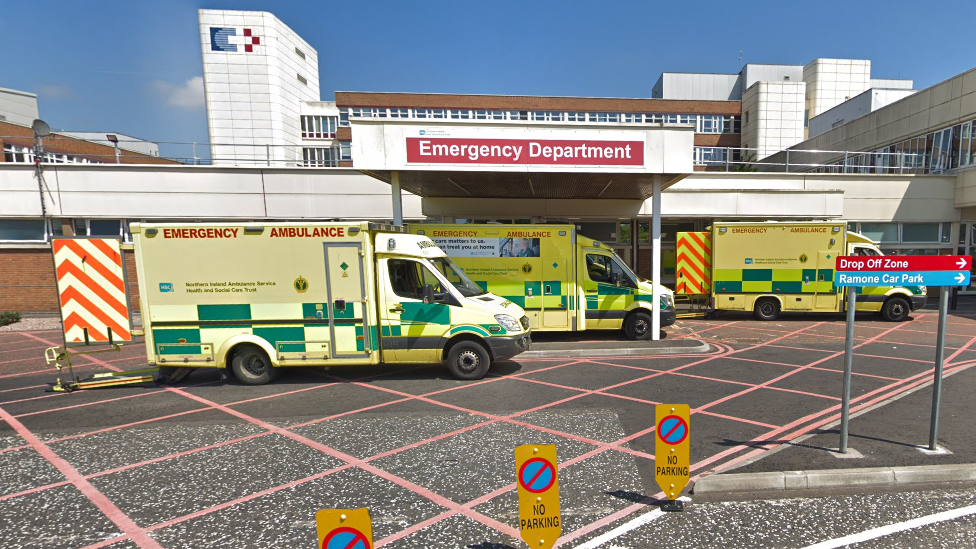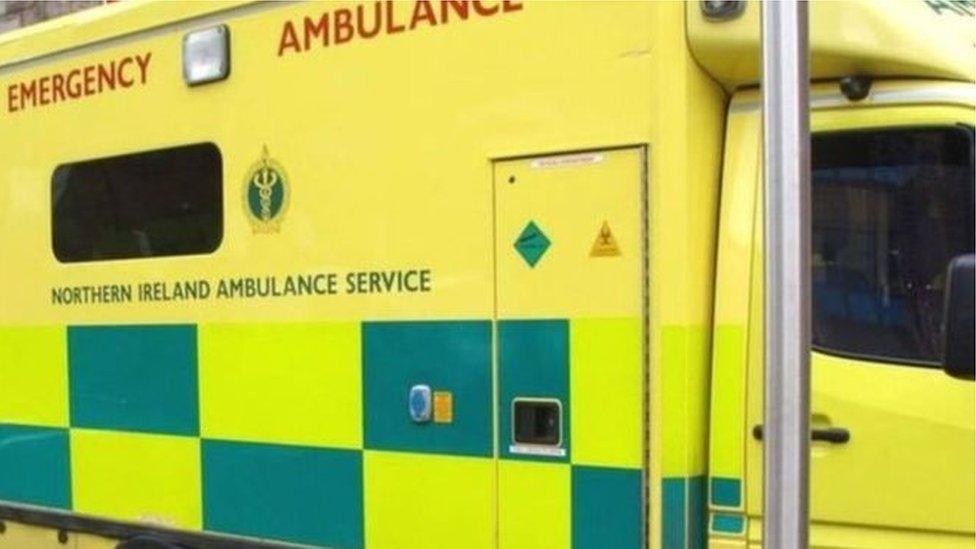Newry: Woman dies waiting for paramedics from Belfast
- Published

A 39-year-old woman who died in Newry, County Down, had been waiting for paramedics from Belfast due to a shortage of crews in the Southern area.
The woman, named locally as Jody Keenan, collapsed in the early hours of Sunday after being out with friends.
After dialling 999, her friends were told there would be a considerable wait as there was no crew available.
The Northern Ireland Ambulance Service is to begin a Serious Adverse Incident Review in to the incident.
A serious adverse incident is defined as any event or circumstance that led or could have led to serious unintended or unexpected harm, loss or damage to patients.
NIAS said it regretted that levels of cover fell below what was "planned and anticipated".
Its medical director Nigel Ruddell told BBC News NI in Ms Keenan's case it had been a "critical call", adding: "It took us too long to respond and we absolutely apologise for that".
It took paramedics about 45 minutes to travel from Belfast to Newry, a journey of about 38 miles.
But by the time they arrived, Ms Keenan had died.
Police officers attended the scene at Trevor Hill in the city before the ambulance arrived. Her death is not being treated as suspicious.

Traumatised mother tried CPR
From BBC News NI reporter Kelly Bonner in Newry
A number of people who knew Jody and her family told me that while her friends waited for the ambulance, her mother arrived at the scene.
She had to give her daughter CPR while waiting for the ambulance. She had been talked through it by the call handler.
Jody was much loved, and would be sadly missed, they said.
She was bright, bubbly, fun to be around and her death leaves a huge void in their lives, they added.

Dr Ruddell said the ambulance service had received a call that a patient had collapsed in Newry at 03:15 BST on Sunday.
"At that time we were under significant pressures and we had had a drop in our available ambulance cover in the Newry area," Dr Ruddell said.
"As a result the nearest available ambulance was dispatched from Belfast, but during the process of that call we did dispatch other resources and indeed the first ambulance to arrive on the scene had been dispatched from Banbridge and arrived about three minutes past four in the morning.
"We were very grateful that the police were able to respond and arrived ahead of our first ambulance with police officers and their defibrillator onto the scene."
Dr Ruddell said they would normally have 10 crews in the Southern division on a Saturday night, thought they were going to have six and a half, but at short notice discovered they were going to have two and a half.
The BBC understands that at 03:00 BST, there were only two ambulance crews in the area and they were waiting at Craigavon Area Hospital to offload patients.
The hospital was also under considerable pressure.

Nigel Ruddell of the Ambulance Service apologised to the woman's family
"In the middle of the week we became aware of some level of dropped cover, hence our efforts to gain support from voluntary crews and some of the private providers who normally assist us," Dr Ruddell said.
"But that was made much more difficult when, on Saturday afternoon, we were made aware at short notice of a number of crews who weren't going to be available to work through sickness and through Covid extraction."
He added: "We are facing a period of unprecedented pressures and that does make it difficult for us to respond at times.
"We are taking a number of steps to try and address that."

Craigavon Area Hospital was under considerable pressure during the early hours of Sunday morning
The emergency department in Daisy Hill Hospital is still open.
A spokesperson for the Southern Trust said: "We extend our sincerest sympathies to the family and friends of this woman.
"Whilst we do not know the specific circumstances involved, we can confirm that both emergency departments at Craigavon and Daisy Hill were extremely busy over the weekend.
"Staff always do their best to work with paramedics to minimise ambulance turnaround times at our hospitals and we continue to work closely with Northern Ireland Ambulance Service on this issue."
Sources have told BBC News NI that it was "distressing" for all staff involved on Saturday night, including those in the control room who felt "helpless".
One staff member said it was one of the most "difficult" shifts they had worked as the woman who died was so young and her friends were distraught waiting such a long time for help.

Analysis: Lunging from one crisis to another
This latest death triggers several questions.
When it comes to health and social care in Northern Ireland, who is accountable when things go wrong and who is holding people to account?
That includes politicians, health trust executives and senior managers.
Unlike other parts of the UK, Northern Ireland does not have an independent health watchdog.
Every health trust has a board who is there to monitor events, performance, ask tough questions and ultimately to hold their most senior managers to account, but we rarely, if ever, hear from these boards.
The Patient and Client Council is meant to be the voice of the patient but rarely do we hear from the council and it tends not to be critical as it is an arm's length body of the Department of Health. It is not independent.
NHS England has no political ties. While it isn't a perfect organisation, at least it is independent.
At the end of March, Northern Ireland's Health and Social Care Board folded with not as much as a whimper. The Department of Health has more or less taken over its role.
Last week, NIAS chief executive Michael Bloomfield did several interviews. He held his hands up and admitted the service wasn't good enough, that the system was failing and he apologised.
The reality is no such independent health person or organisation exists in Northern Ireland to drive change, and therein lies part of the problem.
Northern Ireland has been lunging from one crisis to another for over a decade and the affect has been devastating for the public and staff.
While it won't cure what's wrong with the system, until someone or a body can step in to measure performance, including asking why politicians haven't enabled transformation to proceed at speed, very little will change.

Catherine Farrell, from the union Unison, said it was an "extremely sad story" and extended her sympathy to the woman's family.
She said the pressures that staff were under in the health service were "considerable" and were "getting worse day on day".
"Forty-five minutes is not an unreasonable time to get from Belfast, but for someone that was in need of care at that particular moment, they needed something quicker than that," she added.
Last week, it was revealed that ambulance delays could have been a contributing factor in the deaths of 14 people in Northern Ireland in the past year.
NIAS chief Michael Bloomfield said it was "impossible" to make a direct link with the deaths, but that patients may have been placed at an increased risk.
- Published29 October 2021

- Published2 March 2022
